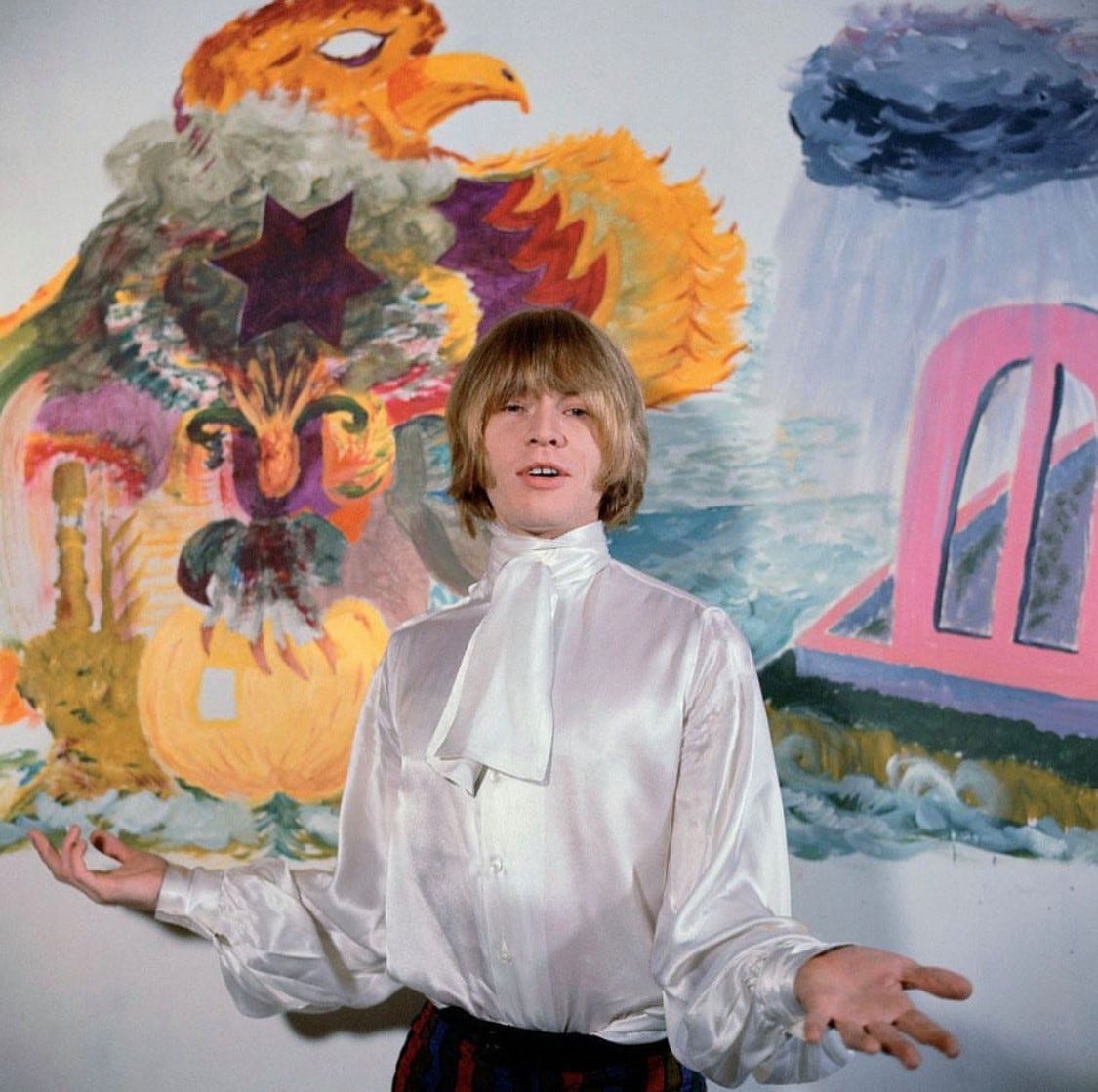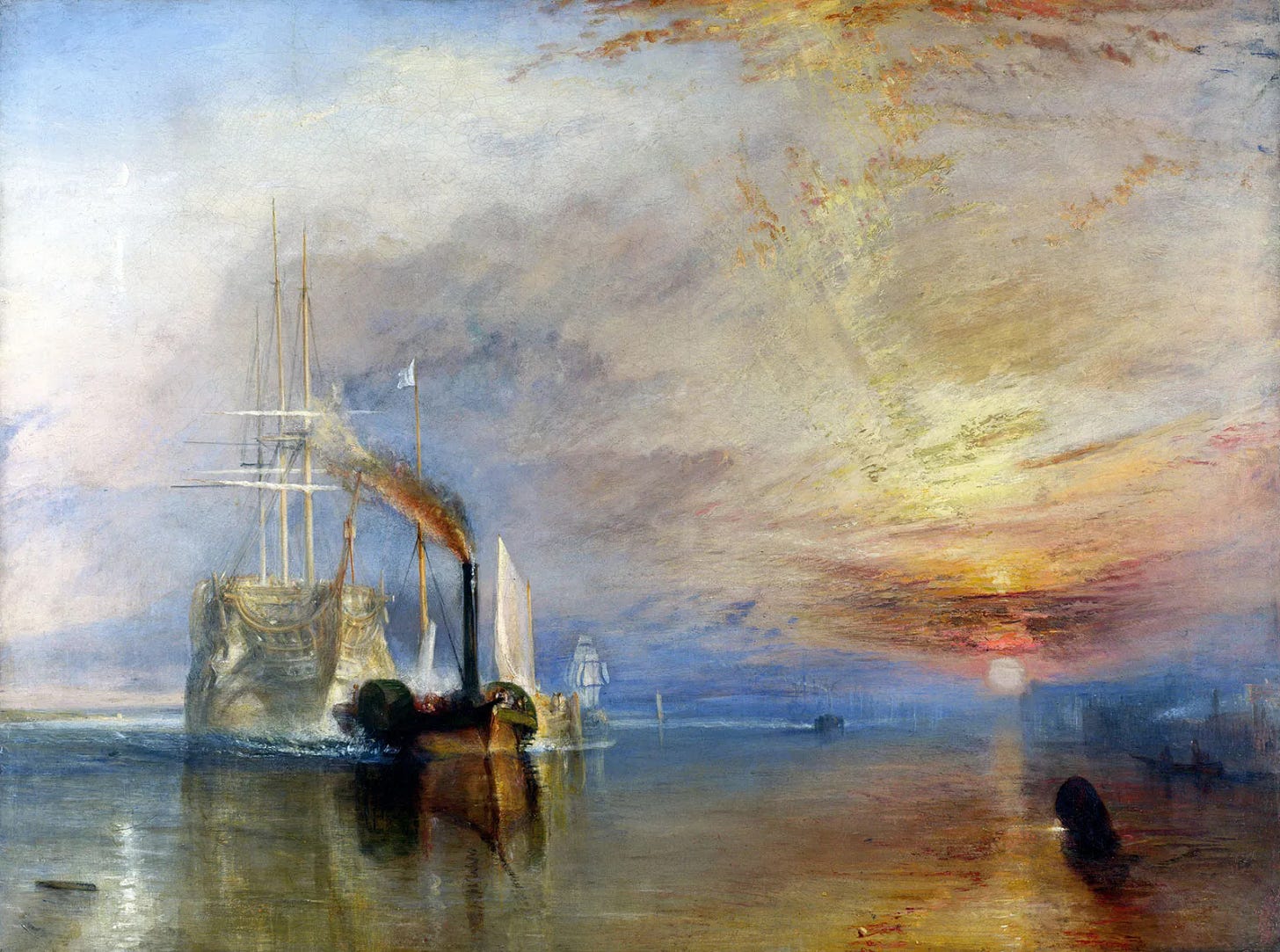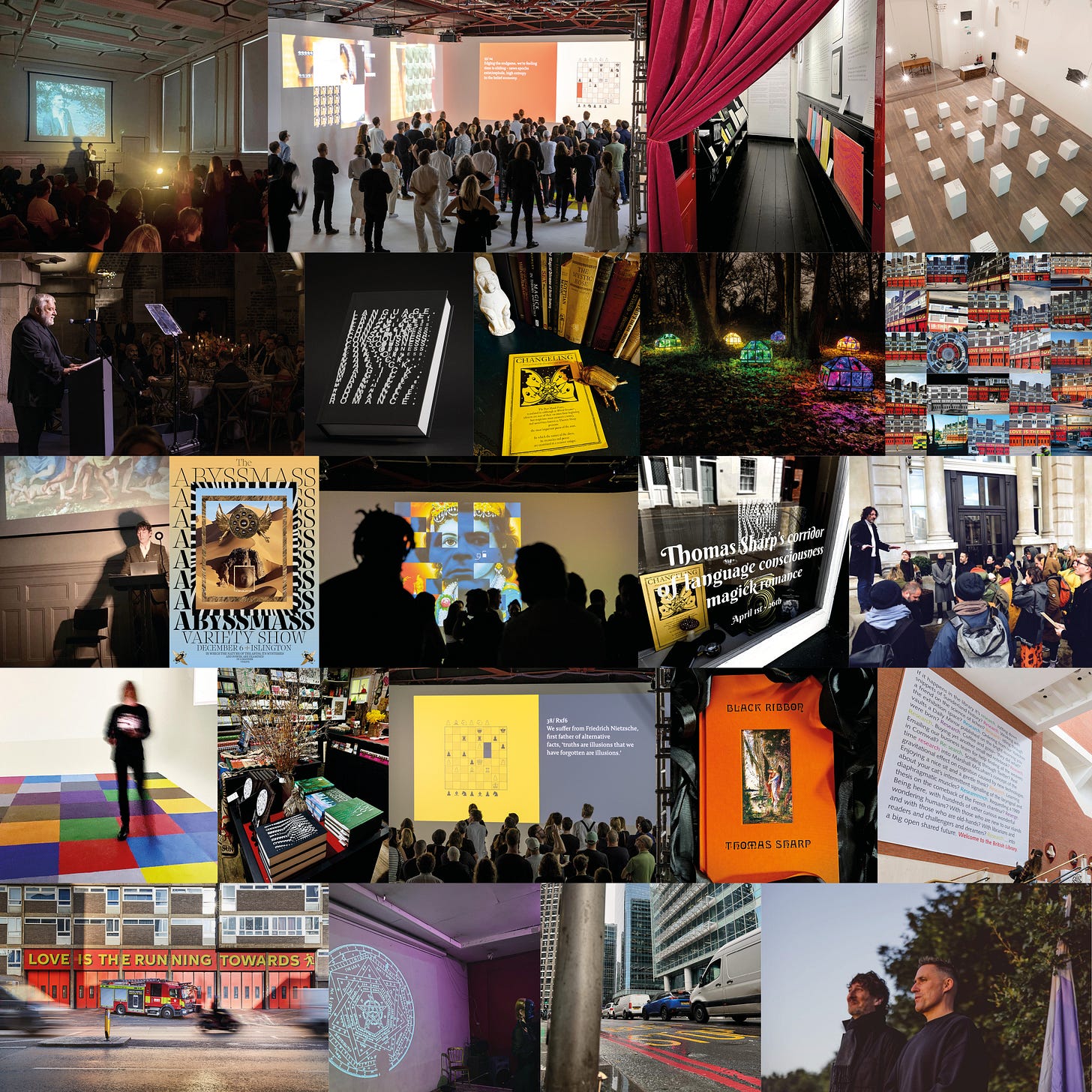And how are you managing the mythic mundane tension today?
Isn’t it tricky?
Your heart never ceases to remind you that everything is made of love and magick and epic narratives and glorious archetypes and beatific light, whilst your brain dutifully worries over the tax bill you need to pay at the end of the month and whether the machine-faced bastards are listening in through your phone that their corporate junk-dealer colleagues got you addicted to.
Anyway, this is a Substack letter with some news of things I do … but that seemed quite superficial, so for each of the five items of news I’ll unpack the mythic mundane tension pulsing away underneath. I know you’re going through the same thing – (not you, machine-faced bastard listening in) – and it’s always quite nice to see other people sharing your adventure isn’t it?
I mean mundane in an ‘of the world’ sense by the way, rather than ‘dull’. Nothing is dull.
The afterlife of the most popular single line of poetry I’ve ever written ‘Love is the running towards’ continues. Following last month’s Instagram share by Pedro Pascal, it has now appeared in Lena Dunham’s new Netflix show Too Much.
You’re probably bored of me referring to this piece now, so apologies. It’s painted above Shoreditch Fire Station in London. I wrote a poem for London Fire Brigade and this is the last line from it. The full poem is below and it appears in my Language Consciousness Magick Romance book in case you want to own it.
The mythic aspect of this line’s strange fame is that it contains a core philosophy I believe in and no doubt you do to. (Not you, the machine-faced bastard.)
That we must run towards other people in their moments of pain and suffering. Othering is the source of so much that is problematic. And I mean this for all Earthly species. When I wrote the poem I was thinking about the London Fire Brigade because they had commissioned me, but I was also thinking specifically about this hero and the almost unconscious compulsion of all humans and elephants to rush to a child who has fallen.
Like you I can’t stop the bombing or the insects dying or the capitalist cruelty but I can try to put constructions of language into the world that contribute to our collective consciousness staying focussed on grace.
The mundane aspect of Lena Dunham using my writing is the obvious but ugly one. I receive no credit and I receive no money. I was paid a small amount for the poem, but smaller than you’d think and absolutely not in parity with the impact it has had. And this year I’ve easily had my worst year of business. The economy is slimy and sluggish. Lena Dunham has $12 million according to those weird net worth websites.
Doesn’t even *mentioning* all of that feel icky? A mythic mundane tension.
The running towards. And always some part of our pageant-and-alleyway city, our Pudding Lane city, our everyone-welcome city, is calling. And always there will be those running towards. A pounding of boots which says there are no ‘others’. An engine’s hurrying growl which says we are only as safe as the most vulnerable amongst us. People are good. People gather their humanity in hot moments and step forward to help those they don’t know. ‘Wailing sirens’ the newspapers say, as if all we hear is a desolate cry keening above the streets ... rather than a protective call of reassurance, a community chorus of ‘we are running your way’. What we do when we get there comes from training. Love is the running towards.
I am now four weeks in to a new series of articles on my website called Friday’s poetry rabbit holes. It’s a subscription offer, £6 a month, and I have five subscribers so far.
The articles work like this, each Friday I’m posting up one of my poems – plus an audio recording – and then falling down all the scientific, literary, philosophical, artistic and high-weirdness rabbit holes that lead from the poetry.
In the first four we’ve tumbled into the invention of the sawing-a-woman-in-half illusion, the inappropriate name of a plane that was on both atomic bombing missions, C.S. Lewis’s infinite regress, Part 8 of Twin Peaks: The Return, naturalist Carl Linnaeus, chimeras, Leonor Fini, Putin’s éminence grise and much more. The approach is not far off this Substack really, just paid for and fewer grouches about Lena Dunham.
I think the presentation of poetry always involves the mythic mundane tension. Poetry exists in the mythic – a timeless formless place of imagination – but rooting it to the mundane, in the worldly issues and concepts that feed it – helps us find our way in and up.
The hope is that Friday subscribers get a burst of thoughtlines to follow and play with each week. The poem I’m exploring this Friday is at the bottom of this letter. It’s about Brian Jones and the mythic. Here is Brian Jones, photographed by Gered Mankowitz in front of a painting Jones did whilst stoned.
Brian Jones drowned at the age of 27 and the grave surrounded by water on the right of the image is often thought to be prophetic.
I am to be the first ever Turner’s House Poet.
Turner’s House is in Twickenham and was designed and built in 1813 by artist J.M.W. Turner for him to retreat to when artistic life in London became too hectic. This year is the 250th anniversary of Turner’s birth, something being celebrated by many galleries. He was radical, endlessly experimental and often misunderstood.
As this piece in The Guardian explains, he could still be regarded as Britain’s best ever artist.
The Fighting Temeraire Tugged to Her Last Berth to Be Broken Up, 1838
Turner was *obsessed* with poetry. He wrote his own and often connected passages of other people’s poetry with specific paintings of his. The more you look at his art, the more you see. As The Guardian article puts it
‘That’s his message. We may think we live in a crushed, unjust place and time but look up and see the light and you can be uplifted by sudden beauty, irradiated by hope.’
The mythic mundane tension is everywhere in his painting. Look at the battered old warship Temeraire heading to its final destination, then see the overwhelming grace in the sky.
Around Turner’s 250th anniversary year I’m honoured to responding to his work. Beginning in September I’ll be creating three poetic experiences, The first is a book and a party. The second, in 2026, will be a lecture on Turner’s poetry. The third will be a curatorial response to his themes – much in the manner of my rabbit hole articles.
Hey, will you let me send you a PDF? No questions asked. It’s my pitch for financial backing for my planned 2026 poetic Happenings.
Don’t worry, if I send you PDF I won’t follow up with any kind of sell. I’m rubbish at selling. I just believe in the power of the crowd and all I need is for this pitch to get in front of one or two of the right people. If that’s not you, you might think of someone else to send it on to.
Since 2019 I have been staging one-night-only literary happenings and poetic experiences. For six years, as I researched and developed my formats whilst building an enthusiastic worldwide audience, these unusual events have been self-funded.
In 2026 my planned four poetry experiences will surpass the reach and impact of my previous creations and I need to do this with external funding. There’s the mythic mundane tension for you.
Commercial backers get to reach the creative, literary, cultural audience my experiences draw in. Private backers less interested in all that get to play a part in shifting reality.
Email yes@thepoetryofitall.com to get the PDF. You’re more than welcome to it even if you’re just curious about how I pitch such things.
The uppermost slab of stone you can see here is engraved with the words ‘Our Longland Is Dreaming’. Twice. It’s presented in boustrophedon, an ancient form of writing meaning ‘as the ox turns’. You read from left to right, and then at the line’s end turn and read right to left. Like you’re ploughing a field.
The words on the stone are set in a new typeface designed by Studio Sutherl& and The Foundry Types.
The first of four Our Longland Is Dreaming rituals is taking place Saturday 19th July, 5pm, in a field just outside Totnes. We’ve hired a magic bus to leave from behind the Seven Stars hotel to take you to the secret location. Sign up here.
For this poetic experience, I’m writing a long poem about revolution and salvation and corruption and hope. As well as the pilgrimage walk with tales of venality and rewilding and reweirding, attendees at each of the rituals will be given beautiful print pieces with the serialised poem. The print pieces will each have an ox’s nose ring through it. See test below.
The four rituals – which will take place in four seasons – are being created to resurrect the medieval figure of Piers Plowman. Star of his own dream within a dream within a dream poem, written by William Langland, and fictive figurehead of the 1381 English Peasants’ Revolt. That’s when the peasants went after their own machine-faced bastards.
Fat cats watch out. The oxen are coming.
Our Longland Is Dreaming is an attempt to unite the mythic and the mundane. The turning of the blood-sticky soil of society to make new fields, the kind love will grow in.
This is Meal, from Language Consciousness Magick Romance. In Friday’s article on my website I’ll fall into the rabbit holes it opens up. Sign up here to read.
Meal Brian Jones from The Rolling Stones is high on hashish in Marrakesh with a court of planets ministering as friends. A goat is led into the yard. Each newhoof cliff- edge uncertain, a tetragramm- aton of taps, echo drowned on lizard-white walls. This was meal. Above a gutter, down which blood will mutter sunslow and thick, a sherpherdchef splits its dusty smoky throat and the goat goes to knee, calm, as was rehearsed. Brian Jones from The Rolling Stones, high on hashish in Marrakesh, leaps to his feet and cries ‘that’s me! Don’t you see? That’s me.’
I am a Creative Director and a poet. If you’d like to commission me to do things with your brand you can see my commercial work here. If you’re interested in buying books and prints or learning about my poetic approach have a look here. I post regular work in progress on my Instagram. Feel free to connect with me on LinkedIn.












How odd: I was born in Twickenham, and never realised that Turner lived there, until 2 days ago when I was sat at my mum's, flicking through the latest newsletter from the Twickenham Museum, and read all about Turner's house and his work in the area. Good luck with becoming House Poet!